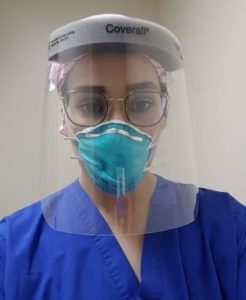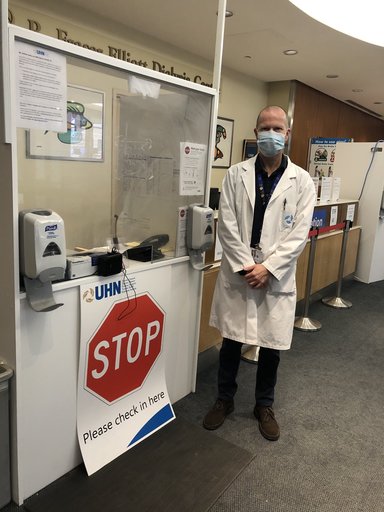
When the World Health Organization declared COVID-19 a pandemic this past March, the Education Leadership team at the Michener Institute of Education at UHN jumped into action to minimize the impact on staff and students.
The first key priority was to ensure Michener students were able to finish their academic programs and enter the workforce to meet the needs of the health care system. Staff and faculty made sure academic programming could continue and accelerated program completion for students in professions critical to the COVID-19 response who are close to graduation, such as Respiratory Therapy and Medical Laboratory Science.
The remainder of winter semester courses were transitioned to online learning and the summer simulation semester moved online using new software technologies, which will continue to enhance learning if and when students return to in-person classes and labs.
Almost all students were able to complete their winter term, with the exception of the Anesthesia Assistant students who were called into service for the pandemic.
“This high completion rate is due to significant efforts by program faculty and support staff who worked diligently to transition the remainder of the semester, including final exams, online,” says Sydney Redpath, Senior Director, Academic Operations and Quality.
As a school integrated within a health network and the health ministry’s partner in labour force planning, it was clear that Michener’s responsibility during a health crisis extended beyond moving classes online. Another integral focus was systems-level leadership and innovation to support the response to COVID-19.
The School of Continuing Education led the development and launch of the Ontario-wide criticalcarelearning.ca and covidcarelearning.ca resource at the direction of the Provincial Critical Care Table. This site was created with significant support from the Ontario health care and education communities to provide key resources to prepare healthcare providers who will be caring for Ontarians impacted by COVID-19. A highly skilled and collaborative team of educational experts, clinicians and academics created educational materials to facilitate safe redeployment. The site supports staff in a variety of professions and roles to bridge their knowledge from current practice to the requirements to care for COVID-19 and other patients and residents.
During this pandemic, there has been an overabundance of information to digest – both good and bad. To help counteract misinformation and direct people to credible scientific evidence as it evolves, a team led by the UHN Health Sciences Library and the Michener Learning Resource Centre team created the Science of COVID-19 Portal. This site curates information that guides evidence-based decision making, patient care, learning and research.
“We are collaborating with partners across our organization to curate reliable, authoritative sources of information, to facilitate knowledge mobilization, to enable our institutions to deliver the best health care, to provide the best education and to conduct the research to end this pandemic,” says Juanita Richardson, Manager of the Learning Resource Centre at Michener.
Additionally, unoccupied floors in the Michener student residence were made available in the event additional call room capacity was needed for UHN residents and fellows. The space was subsequently used for symptom free UHN staff testing COVID-19 positive who did not have another location to self-isolate.

“This opportunity to provide safety and comfort to UHN staff who are working on the front lines is an extraordinary measure, and I’m grateful to our students who agreed to move to a different floor to help their future colleagues,” says Brian Hodges, Executive Vice President Education and Chief Medical Officer, UHN.
The leadership team, staff and faculty also committed to providing resources and support to help learners adapt to the current situation. In addition to regular UHN open forums on COVID-19, three Education Town Halls were held to address concerns and questions from faculty, staff and students. Two additional St. Patrick Campus program-specific forums were held to further support students and faculty.
As students have expressed concerns about the transition to online learning, financial loss and burden, adapting to a new learning environment and anxiety about what lies ahead for both the summer and fall semesters, Michener’s counselling services remain available as a resource to support students with these concerns. The Michener Student Success Network also held an open forum for students on ‘Finding Calm in Times of Change.’
With support from the Toronto General and Western Hospital Foundation, Michener established the General Bursary (COVID- 19) Fund to support Michener students affected by the COVID-19 crisis due to illness, financial stress or isolation from family members and community.
Given concerns for patient, staff and student safety, all on-site clinical learning placements for students at UHN hospitals have been paused and robust MD resident and fellow processes have been developed across UHN and in partnership with University of Toronto to quickly anticipate and respond to emerging priority areas for patient care. In fact, residents have supported key clinical programs across UHN by redeploying to key service areas such as critical care, General Internal Medicine, COVID units and emergency.
A significant focus on learner safety for MD residents and fellows has included access and training for safe use of Personal Protective Equipment (PPE) and guidance in regard to working with COVID positive patients and testing for COVID.
“I couldn’t be more proud to work with such a committed and talented group of people, and I think what our leadership team, staff and faculty has done is proof of our institution’s unique importance to the health care system,” says Brian.